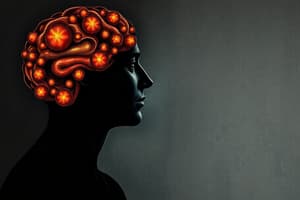Podcast
Questions and Answers
What type of content is primarily provided by the various organizations related to aphasia?
What type of content is primarily provided by the various organizations related to aphasia?
- Personal counseling services for patients
- Only treatment plans for healthcare providers
- Information and resources for patients, families, and professionals (correct)
- Research studies and clinical trials
What is the main focus of the TED Talk 'My stroke of insight' by Jill Bolte Taylor?
What is the main focus of the TED Talk 'My stroke of insight' by Jill Bolte Taylor?
- A personal account of experiencing a stroke and the concept of recovering from it (correct)
- Techniques for improving communication abilities
- The importance of speech therapy in aphasia treatment
- Research findings on aphasia causes
Which of the following audiences does the website aphasia.org primarily target?
Which of the following audiences does the website aphasia.org primarily target?
- Only healthcare professionals working with aphasia patients
- Academics researching neurological disorders
- General public without specific interests in aphasia
- Individuals experiencing aphasia and their families (correct)
How does the video 'What is it like to be unable to communicate?' aim to enhance understanding of aphasia?
How does the video 'What is it like to be unable to communicate?' aim to enhance understanding of aphasia?
In the context of aphasia assessments, what is often a critical factor to consider?
In the context of aphasia assessments, what is often a critical factor to consider?
What major aspect does the course's final project focus on regarding aphasia?
What major aspect does the course's final project focus on regarding aphasia?
Which of the following best describes what happens during the midterm exam of the course?
Which of the following best describes what happens during the midterm exam of the course?
What is one responsibility of professionals who support individuals with aphasia as indicated in various resources?
What is one responsibility of professionals who support individuals with aphasia as indicated in various resources?
What is the primary characteristic of aphasia?
What is the primary characteristic of aphasia?
Which of the following is NOT one of the four broad categories of neurogenic language disorders?
Which of the following is NOT one of the four broad categories of neurogenic language disorders?
What neurological condition is characterized by cognitive-communication impairment due to brain damage?
What neurological condition is characterized by cognitive-communication impairment due to brain damage?
How is aphasia primarily defined?
How is aphasia primarily defined?
Which of the following statements is true regarding individuals with aphasia?
Which of the following statements is true regarding individuals with aphasia?
What causes aphasia in individuals?
What causes aphasia in individuals?
Which cognitive impairment is associated with right hemisphere damage?
Which cognitive impairment is associated with right hemisphere damage?
What is a common misconception about aphasia?
What is a common misconception about aphasia?
Which type of aphasia is characterized by spontaneous speech flow and adequate phrase length?
Which type of aphasia is characterized by spontaneous speech flow and adequate phrase length?
What is a common characteristic of non-fluent aphasia?
What is a common characteristic of non-fluent aphasia?
What is anomia in the context of language impairment?
What is anomia in the context of language impairment?
Which area of the brain is critical for processing auditory information?
Which area of the brain is critical for processing auditory information?
Which type of aphasia results in the ability to repeat phrases but has foundational difficulties in speech production?
Which type of aphasia results in the ability to repeat phrases but has foundational difficulties in speech production?
What does auditory comprehension involve?
What does auditory comprehension involve?
Which characteristic is NOT associated with fluent aphasia?
Which characteristic is NOT associated with fluent aphasia?
What primarily influences a person's ability to understand spoken language?
What primarily influences a person's ability to understand spoken language?
Transcortical sensory aphasia is characterized by difficulties in which language function?
Transcortical sensory aphasia is characterized by difficulties in which language function?
What type of aphasia is associated with both auditory comprehension and reading difficulties?
What type of aphasia is associated with both auditory comprehension and reading difficulties?
Which type of aphasia is characterized by severe spontaneous speech deficits and typically non-verbal communication?
Which type of aphasia is characterized by severe spontaneous speech deficits and typically non-verbal communication?
What factor most influences naming difficulties in individuals with aphasia?
What factor most influences naming difficulties in individuals with aphasia?
Which aspect of language is NOT assessed in the Boston System of aphasia classification?
Which aspect of language is NOT assessed in the Boston System of aphasia classification?
What is a common characteristic of Broca’s Aphasia?
What is a common characteristic of Broca’s Aphasia?
In which type of aphasia might a patient have intact repetition abilities but significant naming deficits?
In which type of aphasia might a patient have intact repetition abilities but significant naming deficits?
Which type of aphasia involves smooth speech but with poor comprehension?
Which type of aphasia involves smooth speech but with poor comprehension?
What is the role of Broca's area in the brain?
What is the role of Broca's area in the brain?
What type of aphasia is characterized by naming deficits and possible logorrhea but poor auditory comprehension?
What type of aphasia is characterized by naming deficits and possible logorrhea but poor auditory comprehension?
Which aphasia type typically shows agrammatism and speech that resembles telegraphic language?
Which aphasia type typically shows agrammatism and speech that resembles telegraphic language?
Anomic Aphasia is often associated with which specific communication issue?
Anomic Aphasia is often associated with which specific communication issue?
Which type of aphasia is characterized by retaining relatively intact oral reading abilities?
Which type of aphasia is characterized by retaining relatively intact oral reading abilities?
What distinguishes Wernicke’s Aphasia from other forms of fluent aphasia?
What distinguishes Wernicke’s Aphasia from other forms of fluent aphasia?
In which type of aphasia is echolalia a common symptom?
In which type of aphasia is echolalia a common symptom?
Which aphasia type is associated with articulation errors and impaired conversational speech without severe comprehension deficits?
Which aphasia type is associated with articulation errors and impaired conversational speech without severe comprehension deficits?
Which type of aphasia generally results in the least fluent speech patterns?
Which type of aphasia generally results in the least fluent speech patterns?
What is a key feature of Transcortical Aphasia?
What is a key feature of Transcortical Aphasia?
What type of naming deficits typically exist in Anomic Aphasia?
What type of naming deficits typically exist in Anomic Aphasia?
Flashcards
What are neurogenic language disorders (NLDs)?
What are neurogenic language disorders (NLDs)?
Acquired neurogenic language disorders (NLDs) are language impairments resulting from damage to the brain, typically affecting communication skills like speech, writing, and understanding language.
What is Aphasia?
What is Aphasia?
Aphasia is a neurogenic language disorder characterized by difficulty expressing, understanding, reading, or writing, affecting both spoken and written language.
What is Right Hemisphere Damage (RHD)?
What is Right Hemisphere Damage (RHD)?
Right Hemisphere Damage (RHD) is another neurogenic language disorder that primarily affects cognitive skills like memory, attention, and impulsivity, often leading to communication difficulties.
What is Traumatic Brain Injury (TBI)?
What is Traumatic Brain Injury (TBI)?
Signup and view all the flashcards
What is Dementia?
What is Dementia?
Signup and view all the flashcards
What is unique about Aphasia?
What is unique about Aphasia?
Signup and view all the flashcards
How are the psychosocial skills of people with aphasia?
How are the psychosocial skills of people with aphasia?
Signup and view all the flashcards
What is the formal definition of Aphasia?
What is the formal definition of Aphasia?
Signup and view all the flashcards
What causes aphasia?
What causes aphasia?
Signup and view all the flashcards
Who are the main users of aphasia resources?
Who are the main users of aphasia resources?
Signup and view all the flashcards
How does aphasia affect a person's life?
How does aphasia affect a person's life?
Signup and view all the flashcards
What is ASHA's role in aphasia resources?
What is ASHA's role in aphasia resources?
Signup and view all the flashcards
What resources does 'The Aphasia Center' offer?
What resources does 'The Aphasia Center' offer?
Signup and view all the flashcards
What is the key message of Jill Bolte Taylor's TED Talk?
What is the key message of Jill Bolte Taylor's TED Talk?
Signup and view all the flashcards
What is the main takeaway from Dr. Goldfarb's TEDx Talk?
What is the main takeaway from Dr. Goldfarb's TEDx Talk?
Signup and view all the flashcards
Aphasias
Aphasias
Signup and view all the flashcards
Cerebral Vascular Accident (CVA)
Cerebral Vascular Accident (CVA)
Signup and view all the flashcards
Aphasia
Aphasia
Signup and view all the flashcards
Boston System
Boston System
Signup and view all the flashcards
Fluency
Fluency
Signup and view all the flashcards
Fluent Aphasia
Fluent Aphasia
Signup and view all the flashcards
Non-fluent Aphasia
Non-fluent Aphasia
Signup and view all the flashcards
Auditory Comprehension
Auditory Comprehension
Signup and view all the flashcards
Repetition
Repetition
Signup and view all the flashcards
Naming
Naming
Signup and view all the flashcards
Anomia
Anomia
Signup and view all the flashcards
Paraphasias
Paraphasias
Signup and view all the flashcards
Phonemic Paraphasia
Phonemic Paraphasia
Signup and view all the flashcards
Semantic Paraphasia
Semantic Paraphasia
Signup and view all the flashcards
Reading
Reading
Signup and view all the flashcards
Writing
Writing
Signup and view all the flashcards
Broca's Aphasia
Broca's Aphasia
Signup and view all the flashcards
Transcortical Motor Aphasia
Transcortical Motor Aphasia
Signup and view all the flashcards
Global Aphasia
Global Aphasia
Signup and view all the flashcards
Wernicke's Aphasia
Wernicke's Aphasia
Signup and view all the flashcards
Transcortical Sensory Aphasia
Transcortical Sensory Aphasia
Signup and view all the flashcards
Conduction Aphasia
Conduction Aphasia
Signup and view all the flashcards
Anomic Aphasia
Anomic Aphasia
Signup and view all the flashcards
What is Broca's Aphasia?
What is Broca's Aphasia?
Signup and view all the flashcards
What is Transcortical Motor Aphasia?
What is Transcortical Motor Aphasia?
Signup and view all the flashcards
What is Global Aphasia?
What is Global Aphasia?
Signup and view all the flashcards
What is Wernicke's Aphasia?
What is Wernicke's Aphasia?
Signup and view all the flashcards
What is Transcortical Sensory Aphasia?
What is Transcortical Sensory Aphasia?
Signup and view all the flashcards
What is Conduction Aphasia?
What is Conduction Aphasia?
Signup and view all the flashcards
What is Anomic Aphasia?
What is Anomic Aphasia?
Signup and view all the flashcards
Damage to Broca's area is responsible for what type of Aphasia?
Damage to Broca's area is responsible for what type of Aphasia?
Signup and view all the flashcards
Study Notes
Aphasia and Cognitive Disorders
- Acquired neurogenic language disorders (NLDs) are defined
- Four broad categories of NLDs are listed: aphasia, right hemisphere damage, traumatic brain injury, and dementia
- Aphasia: language impairments affecting expressing, understanding, reading, and writing
- Right hemisphere damage: memory impairments, attention problems, impulsivity issues, and visual dysfunction
- Traumatic brain injury: cognitive-communication impairment resulting from brain damage
- Dementia: loss of cognitive and linguistic abilities due to progressive brain disease
- Aphasia is not a developmental disorder; it's acquired following neurological injury
- Language problems are not necessarily linked to motor problems
- People with aphasia often have intact psychosocial abilities, except in some cases
- Aphasia is an impairment in comprehension and formulating language due to recent/acquired central nervous system damage (Rosenbek et al, 1989)
- Literal meaning of aphasia is "without language"
- It's a disturbance in the adult language system after language has been established/learned
- It results from neurological injury to the language-dominant hemisphere of the brain, causing receptive and/or expressive problems with spoken or written language.
- CVA (Cerebral Vascular Accidents) - ischemic (occlusive mechanisms), hemorrhagic, cerebral aneurysm, arteriovenous malformation
- Neoplasms (brain tumors)
- TBI (traumatic brain injury)
- Medications
Classification of Aphasia
- Classification of aphasia syndromes (taxonomy) is agreed upon, but there's disagreement on the best approach
- Classification often considers the cause, site of lesion, language characteristics, and dichotomous deficits, such as motor/sensory, receptive/expressive, anterior/posterior involvement, and fluent/non-fluent categories
- Boston System: a framework for characteristics of language impairment (fluency, auditory comprehension, naming, repetition, reading, writing)
- Specific aphasia types (based on the Boston System) include Broca's, Wernicke's, conduction, global, transcortical motor, transcortical sensory, anomic, and subcortical aphasias
Fluency
- Fluent aphasia: smooth, uninterrupted speech flow, usually resulting from posterior brain damage in the temporal/parietal regions in the brain
- Non-fluent aphasia: reduced phrase length, hesitations, slow/labored speech production, grammatical impairments, and variation in pitch/stress; often linked to anterior brain damage (frontal lobe).
Auditory Comprehension
- Auditory comprehension involves understanding spoken language
- It's a complex process encompassing segmenting sounds, understanding words within a sentence, retaining the message in memory, and formulating responses
- Factors influencing comprehension include the amount of information, frequency of word usage, personal relevance of the information, and part of speech
Repetition
- Repetition involves accurately reproducing verbal stimuli heard
- The process involves receiving, processing, and conveying the stimulus to brain regions for formulating and planning the motor sequence for speech
- Good connecting pathways between Wernicke's and Broca's areas are essential for efficient repetition
Naming
- Naming is the ability to retrieve and produce a target word; it's a complex process entailing recognizing the object, retrieving the semantic label, forming the phonological form of the label, and programming speech movements.
- Anomia is a disturbance in the ability to name; it's a pervasive and persistent deficit.
- Paraphasias are errors in naming, including phonemic (substitution/transposition of a phoneme) and semantic errors (similar/related words used instead).
Reading and Writing
- Fluency in writing typically mirrors fluency in spoken language
- Individuals with auditory comprehension problems also struggle with comprehending written information
- Written language impairments often parallel spoken language deficits
Review of Neuroanatomy
- This section is focused on the anatomy
- Critical brain regions in aphasia are frequently mentioned
- There may be another document or video explaining them
Assessment Characteristics
- A variety of detailed characteristics of specific aphasia types, including Broca's, Wernicke's, conduction, global, transcortical motor, transcortical sensory, anomic, and subcortical, are provided, with factors explaining their characteristics
- Information on areas of damage, effects on language functions, fluency (smoothness/interrupted flow of speech), auditory/receptive/expressive comprehension, naming difficulties, articulation errors, circumlocutions, repetition, reading, and writing abilities.
Course Assessments
- A detailed schedule of class, quizzes, case studies, presentations, a midterm exam, and a final exam/project are provided
Studying That Suits You
Use AI to generate personalized quizzes and flashcards to suit your learning preferences.




